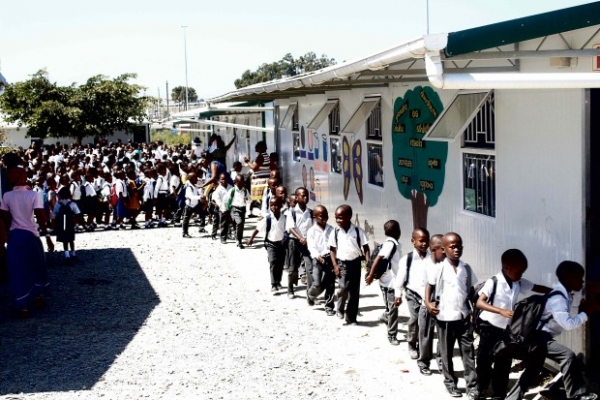Double-shift for Cape Town primary school causes tension

The parents of Mfuleni “tent school” students say that they are still unhappy with the arrangements made to accommodate their children. Now, community leaders are threatening to “evict” Bardale Primary School’s principal, if more classroom space is not made available.
At 1pm on weekdays, Sisanda Nkwandla walks her seven year old son from their home in Mfuleni to Bardale Primary School. Once through the school gates the little boy, possibly sensing that he’s on the verge of being late, runs from his mother and lines up with classmates outside a row of prefab classrooms. Teachers too arrive for the start of their school day, and lead the children in song before overseeing them file into class.
Nkwandla’s son is one of the students who started his Grade 1 in a makeshift tent school - owing to the shortage of classroom space Bardale. Now, in an attempt to accommodate the children, the school has adopted a policy known as “platooning”, which sees a few hundred children start their school day at 1pm - just as the school day for other Bardale students ends. A new group of teachers start with this second batch of students. Classes in this second platoon end at 7pm.
“For me this is not normal that the children should start their day so late,” says Nkwandla, standing in the shade along with other parents waving their children goodbye for the afternoon.
“He is very energetic and alert in the morning, but by this time it is hot and he is quite tired. How can he concentrate? It is not a good way for him to start his education like this. I’m afraid that it will put him on the back foot. That is why we are putting pressure on the (Western Cape Department of Education) to build more classrooms, or a whole new school altogether.”
The school is also short of a Grade R class, so Nkwandla spends her afternoons tending to her second child - a five year old girl. Having to care for the children throughout the morning, and into the afternoon means that she is being hampered in her efforts to find a job. To find employment, she says, one has to travel far from Mfuleni because the opportunities are “out there, not in here”.
“This platooning thing is really disadvantaging our community and children, because we feel that there is a general tiredness among everyone so late into the afternoon,” said community leader Bongani Tyembile, who estimates that 580 kids are obliged to take these afternoon classes, if they are to see the inside of a classroom at all.
Children in class at Bardale Primary. Photo by Masixole Feni.
“What is needed, and this is an urgent need, is more classroom space. But, ideally we need a new school to be opened for this section of Mfuleni and we need a Grade R at Bardale. Because, in my experience the area’s population has grown a lot in recent years.” Tyembile complains that their pleas have fallen on deaf ears at the Department of Education, but Paddy Attwell, the department’s spokesman, contests this.
Attwell said that “platooning” was in fact the approach insisted upon by community leaders, when strategies for accommodating the tent children was being devised. The other alternative, which Attwell says was rejected by the community, was shuttling children to neighbouring schools.
“The representatives rejected (the department’s offer of providing transport), despite detailed explanations by department officials why platooning was not the best option,” he said.
“We can confirm that our officials are engaging extensively with the community. The department has appointed additional staff at the school to cater for the increased number of learners. The department is exploring all available options to cater for the community’s education needs.”
Support independent journalism
Donate using Payfast

Next: Philippi students speak out about police showdown
Previous: Heideveld patients protest as disability grant applications declined

This article is licensed under a Creative Commons Attribution-NoDerivatives 4.0 International License.
